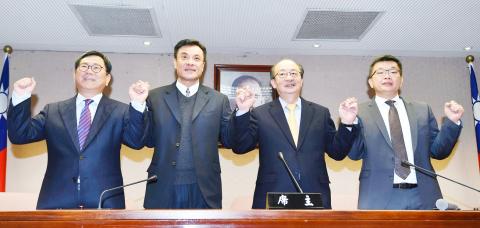Democratic Progressive Party (DPP) legislator-elect Su Jia-chyuan (蘇嘉全) is likely to become the nation’s first non-Chinese Nationalist Party (KMT) legislative speaker on Monday, as the DPP caucus yesterday nominated him for the post.
DPP caucus whip Ker Chien-ming (柯建銘), Legislator Chen Ming-wen (陳明文) and Su had all been interested in running for the speakership, and a vote within the caucus was planned to select a candidate during yesterday morning’s meeting.
However, before the meeting was to begin at 9am, Ker appeared outside the meeting room, along with Chen and Su, all three smiling.

Photo: Fang Pin-chao, Taipei Times
“I think it is easiest [to solve the issue] if we three talk among ourselves,” Ker said. “We have reached a simple conclusion: to support Su as the party’s candidate for legislative speaker.”
Ker said he is confident that when Su is elected speaker, he will be able to keep the legislature running smoothly, leaving president-elect Tsai Ing-wen (蔡英文) worry-free.
When asked about rumors that he had said he would rather die than withdraw from the speaker election, Ker denied ever making such a remark.
Ker declined to discuss whether he would continue to serve as caucus whip.
The caucus unanimously passed nomination of Su as the DPP’s speaker candidate and the nomination of DPP Legislator Tsai Chi-chang (蔡其昌) as deputy speaker candidate.
With an absolute majority of 68 seats, accounting for 60.1 percent of the legislature, the DPP’s candidates are almost certain to win the speakership and deputy speakership.
Ker said he had a sleepless night as negotiations between himself, Su and Chen Ming-wen hosted by Kaohsiung Mayor Chen Chu (陳菊) at DPP headquarters in Taipei on Thursday failed to generate any concrete results.
“So I called Chen and Su at 7am and asked them to come to my office to discuss the issue,” Ker said.
“We started our meeting at 8am and, after some discussion, we felt we should try to maintain harmony within the party, and should not disappoint the people, nor force the party’s central leadership to intervene in the speaker election, and reached our decision,” Ker added.
On a trip to thank her supporters in Yunlin and Chiayi counties, Tsai Ing-wen welcomed the decision, while denying she had talked Ker out of the race.
“I am happy our caucus members were able to negotiate among themselves to smoothly work out candidates for legislative speaker and deputy speaker,” she said.
“I hope that in the future, we can integrate different opinions within the party on important issues to start the reform agenda as soon as possible, based on the values of solidarity and reform,” she added.
Tsai Ing-wen denied that she had overridden the will of the caucus, as there had been speculation that she preferred Su to serve as speaker.
She said she had merely “reminded” the caucus about the public’s expectations.

SECURITY: As China is ‘reshaping’ Hong Kong’s population, Taiwan must raise the eligibility threshold for applications from Hong Kongers, Chiu Chui-cheng said When Hong Kong and Macau citizens apply for residency in Taiwan, it would be under a new category that includes a “national security observation period,” Mainland Affairs Council (MAC) Minister Chiu Chui-cheng (邱垂正) said yesterday. President William Lai (賴清德) on March 13 announced 17 strategies to counter China’s aggression toward Taiwan, including incorporating national security considerations into the review process for residency applications from Hong Kong and Macau citizens. The situation in Hong Kong is constantly changing, Chiu said to media yesterday on the sidelines of the Taipei Technology Run hosted by the Taipei Neihu Technology Park Development Association. With

CARROT AND STICK: While unrelenting in its military threats, China attracted nearly 40,000 Taiwanese to over 400 business events last year Nearly 40,000 Taiwanese last year joined industry events in China, such as conferences and trade fairs, supported by the Chinese government, a study showed yesterday, as Beijing ramps up a charm offensive toward Taipei alongside military pressure. China has long taken a carrot-and-stick approach to Taiwan, threatening it with the prospect of military action while reaching out to those it believes are amenable to Beijing’s point of view. Taiwanese security officials are wary of what they see as Beijing’s influence campaigns to sway public opinion after Taipei and Beijing gradually resumed travel links halted by the COVID-19 pandemic, but the scale of

A US Marine Corps regiment equipped with Naval Strike Missiles (NSM) is set to participate in the upcoming Balikatan 25 exercise in the Luzon Strait, marking the system’s first-ever deployment in the Philippines. US and Philippine officials have separately confirmed that the Navy Marine Expeditionary Ship Interdiction System (NMESIS) — the mobile launch platform for the Naval Strike Missile — would take part in the joint exercise. The missiles are being deployed to “a strategic first island chain chokepoint” in the waters between Taiwan proper and the Philippines, US-based Naval News reported. “The Luzon Strait and Bashi Channel represent a critical access

Pope Francis is be laid to rest on Saturday after lying in state for three days in St Peter’s Basilica, where the faithful are expected to flock to pay their respects to history’s first Latin American pontiff. The cardinals met yesterday in the Vatican’s synod hall to chart the next steps before a conclave begins to choose Francis’ successor, as condolences poured in from around the world. According to current norms, the conclave must begin between May 5 and 10. The cardinals set the funeral for Saturday at 10am in St Peter’s Square, to be celebrated by the dean of the College